
Elias Kafantaris & Robert Refior II
Two remarkable volunteers retire after decades of chairing one of the most important historical events the ICBA hosts.


ICBA Logo and Letterhead Policy



Elias Kafantaris & Robert Refior II
Two remarkable volunteers retire after decades of chairing one of the most important historical events the ICBA hosts.



Founded in 1895, the Ingham County Bar Association continues its longstanding tradition of service to the legal profession and the greater Lansing community, bringing lawyers together to join in a strong organization that works to achieve objectives that transcend the individual.
INGHAM COUNTY
BAR ASSOCIATION
P.O. Box 66
Grand Ledge, MI 48837 www.inghambar.org
BOARD OF DIRECTORS
President
Stephen Sinas
Sinas Dramis Law Firm
President-Elect
Lindsay Dangl
Murphy & Spagnuolo PC
Vice President
Alexander Rusek
Foster Swift Collins & Smith PC
Treasurer
Jessica Zimbelman
State Appellate Defender Office
Secretary Mary Bowen
Attorney Grievance Commission
Immediate Past President
Pamela Amato
Mallory Lapka Scott & Selin, PLLC
Ernscie Augustin
Augustin Law Offices
Jacquelyn Dupler
Foster Swift Collins & Smith PC
Nolan Erickson
Grewal Law PLLC
Lauren Kissel
Sinas Dramis Law Firm
Lynn Osborne
Osborne & Barrett PLLC
Ted Seitz
Dykema Gossett PLLC
Marisa Vinsky
Chartier & Nyamfukudza PLC
Chris Wickman
The Nichols Law Firm PLLC
Bankruptcy Law
Lynn Osborne
Osborne & Barrett PLLC
Criminal Defense Law
Takura Nyamfukudza
Chartier & Nyamfukudza, PLC
Marisa Vinsky
Chartier & Nyamfukudza, PLC
Chris Wickman
Nichols Law Firm, PLLC
Employment & Labor Law
Kelly McClintock
Blanchard & Walker PLLC
Family Law
Jennipher Martinez
White Schneider Young & Chiodini, PC
Erica Terranova
Bailey & Terranova
Paralegal/Legal Assistant
Megan L. Cochrane
Foster Swift Collins & Smith PC
Lizzy Sailor
Chartier & Nyamfukudza, PLC
Probate & Trust Law
Ernscie Augustin
Augustin Law Offices
Real Estate Law
William D. Tomblin
William D. Tomblin & Associates
Ellen E. Ward
Oade Stroud & Kleiman PC
Mitchell Zolton
Fahey Schultz Burzych Rhodes PLC
Young Lawyers
Marisa Vinsky
Chartier & Nyamfukudza PLC
Annual Dinner
Lindsay Dangl
Annual Meeting
Lindsay Dangl
Ask A Lawyer
Raymond Harris / Brandon Schumacher / Chris Wickman
Awards
Jacquelyn Dupler / Mary Bowen
Barristers
Lauren Kissel / Marisa Vinsky
Bench Bar - Mary Bowen / Nolan Erickson / Lynn Osborne
BRIEFS
Board
Diversity, Equity & Inclusion
Kristina Bilowus / Jessica Zimbelman
Education
Chris Wickman
List Serve Staff
Meet the Judges
Pam Amato / Ted Seitz
Membership Jacquelyn Dupler / Lynn Osborne
Nominating Committee Pam Amato
Past Presidents’ Pam Amato
Section Chair Liaison
Chris Wickman
Shrimp Dinner
Elias Kafantaris / Alexander Rusek / Michael Van Huysse
Social Deliberations
Jacquelyn Dupler
Social Media
Stephen Sinas / Staff
Sponsors
Ernscie Augustin / Lindsay Dangl / Alexander Rusek
EXECUTIVE DIRECTOR
Madelyne Lawry
517-627-3938
ICBA’s annual leadership transition has begun. In that respect, on July 1, 2024, I became Immediate Past President, and Lindsay Dangl became President. The Board will also vote on which board members will become Officers to serve in the roles of President-Elect, Vice President, Treasurer, and Secretary. Furthermore, as of July 1, 2024, two current ICBA board members, Pam Amato and Ernscie Augustine, have stepped down from the board and been replaced by newly elected board members, Katie Tucker and Tiffany DeBruin. Pam and Ernscie have been exemplary board members whom we cannot thank enough for their years of dedicated service, hard work, and commitment to ICBA. We also give special thanks to Pam for her years serving as an ICBA Officer, especially her productive and successful year as President in 2022-2023.
It is great knowing that as I leave the Presidency, the leadership within ICBA is as strong as ever and poised to continue serving our members well and moving our association forward. Currently, because of the efforts of our diligent board members, as well as that of our Executive Director, Madelyne Lawry and her team, ICBA is thriving. We have had record attendance at many of our events this past year. Our
sponsorship committee, led by Lindsay Dangl and Alex Rusek, has continued to excel by adding additional law firms and non-law firms as ICBA sponsors, which has greatly benefitted ICBA’s financial health. We continue to put on various educational events for our members. Our Young Lawyers Section continues to do amazing work representing and connecting with our younger members. And perhaps most importantly, ICBA continues to bring people in our legal community together in many meaningful ways.
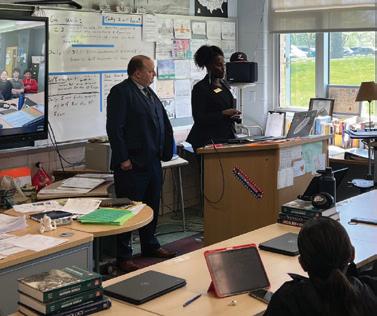
This past year, the ICBA board also achieved other notable accomplishments. We overhauled ICBA’s bylaws to better serve the needs of ICBA. We updated ICBA’s article of incorporation to better comply with the Michigan Non-Profit Corporation Act. We created ICBA’s Committee on Well-Being in the Law
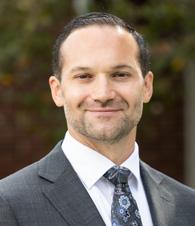
Stephen Sinas, Sinas Dramis Law Firm
stevesinas@sinasdramis.com
to promote well-being within the legal profession in Ingham County. We launched a new annual event designed to specifically thank those who dedicate their time and energy to ICBA events, seminars, and activities. And most recently, we launched an initiative to have local judges and lawyers go into local high schools and provide presentations in which they share their insights about the realities of the practice of law and the judicial system.
Our initiative with local high schools was based on our belief that ICBA must not only serve our members, but also our community at large. In that regard, we recognized we should be doing more to connect with and educate the younger people in our community. We tried to make these presentations happen during the week of Law Day, which was on May 1, 2024. The initiative was challenging to get off the ground this year because of the various communications and logistical planning that arose with the various school districts, judges, and lawyers involved. It was heartening to see so many local judges and attorneys come forward to volunteer their time amidst their busy lives to help with these presentations. In fact, we ended up having more judges and lawyers wanting to participate than we had presentations to offer them. On
President’s Message continued that note, our events with East Lansing High School and Okemos High School were, unfortunately, unable to go forward as planned. But we did manage to go forward with these presentations at three different high schools within the Lansing School District:
• On May 2, Ingham County Circuit Court Judge Lisa McCormick and attorneys Mary Bowen and Lynn Osborne presented to the students at Eastern High School. Judge McCormick provided a good summary of how the court system operates, and she also shared how important it has been for her throughout her legal career to continue believing in herself and to not let fear hold herself back. Mary and Lynn shared what their current law practice involves and how their confidence, determination, and hard work have guided their journey as lawyers.
• On May 3, 54-B District Court Judge Lisa Babcock and attorneys Gabe Lawrence and Alex Rusek presented to a government class at Sexton High School. Judge Babock provided valuable insights into the realities of how her courtroom operates and the role she attempts to serve as a fair and unbiased judge. Gabe and Alex both provided good explanations about the realities of their respective fields of practice, and they shared certain lessons they have learned from the practice of law.
• On May 4, 54-A District Court Judge Kristen Simmons and attorney Chris Wickman presented to a government class at Everett High School. Judge Simmons offered a great general explanation of how the court system
operates and the different legal standards that apply to criminal and civil cases. She also explained her successful career path that led her to become a judge. Chris also explained his career path as a lawyer, and he also offered his perspective on what it really means to be lawyer who provides dedicated representation to his clients.
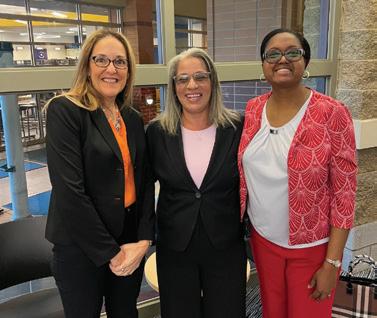
The judges and lawyers involved with these presentations made a genuine connection with the students and provided them with real-world insights into the practice of law that the students simply could not get from nonlawyers. Furthermore, the prospective provided by the judges turned out to be consistent with goals of the American Bar Association (ABA) Judicial Division’s National Judicial Outreach “Whenever, Wherever” initiative, that seeks to encourage trial court judges to hold events throughout the year that engage their local communities to foster confidence in the judicial system and the rule of law. Notably, the Michigan Supreme Court has been urging Michigan trial court judges to participate in the ABA’s Outreach program. To this effect, in a recent memo Michigan Supreme Court Chief Justice Elizabeth
T. Clement sent to judges and state administrators, she stated, “I believe strongly that when judges engage the public, their courts are more trusted by the community as a whole,” and that [w] ith that trust comes higher confidence in the judicial system and in the belief that local courts are fair and unbiased, take the needs of people into account, and serve as an appropriate check on the other branches of government.” From what I observed, the judges involved in these high school presentations shared the types of insights and perspectives that help build that confidence and trust in our judicial system that Justice Clement was referencing in her memo.
Going forward, I hope ICBA leadership expands upon this year’s efforts to present at local high schools in our community. With the amount of misinformation out there these days about the judicial system, it seems more important than ever that we make this happen. Moreover, it seems feasible to make this happen, considering the sincere interest expressed this year by local high schools and the widespread willingness of judges and lawyers to help the cause. Furthermore, if we expand upon these efforts going forward, ICBA will further demonstrate that it remains committed to not only serving our members, but also serving this great community we all have the privilege to practice law in.
In closing, it is one of my greatest professional honors to have served as President of ICBA. I am sincerely thankful to have had this opportunity. I look forward to all the great accomplishments ICBA’s future leaders will achieve going forward.
By Jessica Zimbelman, ICBA Treasurer Managing Attorney, State Appellate Defender Office
* The criminal case law update will include Michigan Supreme Court decisions and substantive orders and published Court of Appeals decisions from the prior quarter. If there are specific topics a reader would like a deeper dive on, please email me at jzimbelman@sado.org

Jessica Zimbelman
jzimbelman@sado.org
Karl Butler, Docket No. 165162, Opinion issued March 25, 2024: The trial court failed to follow the proper procedure in determining whether to admit evidence of prior false allegations by the complaining witness. The Supreme Court remanded to the trial court with instructions to follow the proper procedure: Mr. Butler’s initial offer of proof was sufficient, and the trial court must hold an in camera evidentiary hearing to determine admissibility.
Michael Carson, Docket No. 355925, issued February 15, 2024: The Court held that it violates Double Jeopardy to be convicted of larceny and receiving/ concealing stolen property. The Court
also held that the warrant authorizing the search of Mr. Carson’s cell phone violated the particularity requirement because it authorized a general search of the entirety of the phone’s contents and it could not be saved by the exclusionary rule.
Jamar Purdle, Docket No. 353821, issued February 22, 2024: After remand from the Michigan Supreme Court, the Court affirmed Mr. Purdle’s sentence, holding that the de facto life sentence was not disproportionate under Posey.
Larisio Johnson, Docket No. 362236, issued March 14, 2024: The Court affirmed the imposition of consecutive sentences, finding that Dixon-Bey does not apply to consecutive sentencing.
Derrick Braddock v Parole Board, Docket No. 365095, issued March 28, 2024: The Parole Board’s vote on whether to parole cannot end in a tie.
Quatrail Smith, Docket No. 362114, issued April 4, 2024: Covid delays are not attributable to the government for the purposes of a speedy trial claim.
Mohamed Boukhatmi, Docket No. 363998, issued April 4, 2024: The trial court improperly scored Offense Variable 13 based on acquitted conduct. It should have been scored at zero points, which entitled Mr. Boukhatmi to resentencing.
David Serges, Docket No. 355554, issued April 4, 2024: The Court analyzed several issues, including the delayed search and seizure of a pair of pants, prosecutorial error, composition of the jury panel, and various Covid trial issues.
Winford Gash, Docket No. 365693, issued April 11, 2024: There was sufficient evidence to support the second-degree murder conviction. Counsel was not ineffective in asking Mr. Gash about his withdrawn plea because Mr. Gash had waived the protections of MRE 410.
William Motten, Jr., Docket No. 363044, issued April 18, 2024: The holding of Beck is not retroactive.
Lorenzo Williams, Docket No. 365299, issued April 18, 2024: There is no Fourth Amendment violation when an officer stops a person to ask to see their concealed pistol license.
Kimberly Langston, Docket No. 367270, issued April 25, 2024: MCL 750.227 does not violate the Second and Fourteenth amendments (analyzing the United States Supreme Court decision in Bruen).
Anthony Brown, Docket No. 359376, issued May 2, 2024: Having witnesses wear masks during Covid does not violate the Confrontation Clause.
By Kristina Bilowus

Kristina Bilowus bilowusk@msu.edu
“Rizz.” ‘Slay.” “ASL.” “Fire.” For me, ASL means American Sign Language. Law school taught me fire was never to be shouted, particularly in a crowded theater, unless there was an actual fire. However, these terms of art are popular vocabulary to the most recent generation, Gen Z. Identified as individuals born between 1996 to 20101, Gen Z are many of our current law students and newer attorneys entering the legal profession.
As someone born in the 1980s and classified as a Millennial, I am the closest generation to the current one. However, from popular terms to work expectations, I have already felt the generational divide. And from the lens of diversity, equity, and inclusion, I thought this topic was ripe for the legal profession.
The legal field is one that is rooted in longevity, experience, and building a reputation. Not surprisingly, we are engaged in multigenerational work. For example, there may be four (or
even up to five) generations working together in a single entity, such as a firm. And within this multi-generational workforce, different expectations and priorities exist.
Looking to the general concept of what a generation means, it is understood as people born around the same time and share similar life experiences.2 Some of our generational experiences may overlap, but it’s really about what makes something universal for a collective group of people. And as such, different experiences shape different expectations. Simply put, age is not the sole factor when considering what comprises a generation.
These aspects are helpful to consider when cultivating a positive work environment. For many Gen Z law professionals, the COVID-19 pandemic may have impacted their career development more than any other generation. Considering that so many attended undergraduate or law school online for significant portions of time, began their legal careers remotely or in a hybrid format, and did not interface in person for networking, their entry into the legal profession has been a unique experience.
Additionally, the current generation is tech-savvy and multitaskers. They tend to take the literal meaning of something to be the exact meaning and place a priority on work fitting around their lifestyle (and not the other way around).
Looking to other generations that may be in the legal field, we have Millennials, Gen X, Baby Boomers, and Maturists (those born before 1945)3. Similar to Gen Z, unique characteristics, attributes, and aspirations are linked to each group. Dissimilar to Gen Z, different expectations exist. While five generations typically are not present in every work environment, there is generally a mix (and now a clash) of generational values and priorities.
The COVID-19 pandemic impacted everyone, but every generation except the current one began their career beforehand. Conversely, Gen Z grew up with the most technological advancements to date, while prior generations saw the growth firsthand.
Understanding generational differences as well as opportunities to learn, can enhance the legal profession. In the workplace, retaining talent from across generations, strengthens the business. Each generation brings strengths, ideas, unique perspectives, and the ability to share knowledge. Unfortunately, biases and stereotypes work against these forms of collaboration. From the classic lines of “she’s too young or “he’s too old” to “kids today” or “she’s basically a dinosaur,” biases detrimentally impact productivity and growth. They also negatively impact our ability to understand opportunities for common ground.
Not every transition and level of understanding is easy. Each of us have
DEI - Generational Equity! continued our own biases (implicit or otherwise) and perspectives. It’s part of what makes us human. Thus, generational differences can provide obstacles and learning curves. While it’s perfectly okay to recognize our own perspective, it is important that we check our biases. Unchecked bias and a lack of reframing can lead to bad behavior, stereotyping, and limiting growth.
Rather, working collectively to understand each generation’s strengths and learn from each other’s differences, helps provide a more well-rounded workplace. Like other aspects of diversity, varying ages help enrich a workplace culture. By taking the time to learn best practices of working together in a multigenerational work environment helps cultivate inclusivity, as well as productivity.
At times the generational divide may feel like a deep chasm, next to impossible to bridge. Expectations may seem hard to meet, let alone understand. However, it is the direct concept of generational equity that helps move the legal profession forward.
As previously discussed, equity does not mean equality. It’s about meeting people where they individually are at, and understanding their position and needs. Working with different generations is no different.
Whether you identify as a Maturist or Gen Z (or for many of us – somewhere in between), knowing your strengths and attributes are necessary. Also of significant importance, is understanding the priorities and viewpoints of those you work with. Generational differences
are no exception. By learning and collaborating across the years, we can build better businesses and provide well-rounded services for the clients we serve.
Endnotes
1 What is Gen Z? https://www.mckinsey.com/ featured-insights/mckinsey-explainers/what-isgen-z (March 20, 2023), last accessed May 15, 2024.
2 Dimock, Michael. Defining Generations: Where Millennials end and Generation Z begins. Pew Research Center. https://www.pewresearch.org/ short-reads/2019/01/17/where-millennials-endand-generation-z-begins/ (January 17, 2019), last accessed May 15, 2024.
3. Villages, Audley. Are you a Boomer or Gen X? Understanding the Generations. https:// www.audleyvillages.co.uk/audley-stories/story/ understanding-the-generation-gap (May 5, 2023), last accessed May 15, 2024.

Hon. Shauna Dunnings tells why you should be an ICBA Member
124 W. Allegan St., Suite 1000
Lansing, MI 48933

One Woodward Ave., Suite 1550
Detroit, MI 48226
125 Ottawa Ave NW, Suite 153
Grand Rapids, MI 49503
(517) 482-5800 (313) 237-7300 (616) 301-0800
For Immediate Release
Contact: Eriks Dumpis May 3, 2024 (517) 377-0865
edumpis@fraserlawfirm.com
‘Michigan

Robert D. Burgee
bburgee@fraserlawfirm.com
by
Lansing, MI – Fraser Trebilcock
Shareholder Robert D. Burgee has been recognized by Michigan Lawyers Weekly as a ‘Michigan Go To Lawyer’ in 2024 for business transactions. “I am honored to have been recognized by Michigan Lawyers Weekly as a ‘Michigan Go To Lawyer’ for business transactions,” said Bob.
Mr. Burgee serves as Co-Chair of the firm’s Business & Tax Department and Chair of the firm’s Employee Benefits Department. He has over a decade of experience assisting business clients and entrepreneurs with startups, acquisitions, succession, and growth planning, as well as more general
legal guidance, including navigating civil matters, regulatory compliance, employee benefits, and human relations.
Michigan Lawyers Weekly’s program honors leading lawyers in a particular field of law as nominated by their peers. Michigan’s Go To Lawyers identifies and recognizes the top lawyers across the state in a given practice area. You can find more information and the full list here.
Since 1883, Fraser Trebilcock has been providing preeminent legal services and representation to small and large businesses, individuals, governmental entities, and associations. Through its association with SCG Legal, Fraser Trebilcock has access to a global network of independent law firms. More information is available at fraserlawfirm.com| scglegal.com
By Julie Dillon

Julie Dillon juliedillon2000@gmail.com
Julie Dillon is the owner of Be Balanced Studio. She is a speaker, certified Yoga teacher, Pilates instructor, and YogaQi Gong practitioner with 20 years of experience in the wellness industry. Her practice provides a holistic approach to coaching: integrating movement with breathwork, postural alignment, flexibility, and other mindfulness techniques.
To learn more, visit her website: www.bebalancedstudio.com. 517-927-8431
In today’s fast-paced work environment, prioritizing and maintaining wellness might seem challenging, but caring for your health during work hours is both achievable and essential. Here are some general strategies to boost your wellbeing right at your desk, helping you reduce stress and stay energized and productive throughout the day.
• Stay Hydrated: Keep a water bottle handy and sip regularly throughout the day. Staying hydrated not only fights fatigue but also enhances cognitive function, helping you stay focused. While many of us think we’re getting enough water, it’s easy to fall short. Make a conscious effort to track your intake and ensure you’re properly hydrated.
• Mindful Movement Breaks: Incorporate movement into your workday to invigorate your body and refresh your mind. Whether it’s a brisk walk around the office (or better yet - outside), a series of desk stretches (see below!), or a quick yoga flow during your lunch break, prioritize these mini-movement breaks to offset the sedentary nature of office life and renew your energy.
• Healthy Snacking: Fuel your body with nutrient-dense snacks to sustain your energy levels throughout the day. Keep on hand wholesome options like nuts and seeds, turkey sticks, yogurt, and hummus to stave off midday slumps and keep your energy going strong.
• Breathing: One of the best stressreducing techniques is mindful breathing. Practicing basic abdominal breathing can soothe your body and mind.
Place your hands on your lower rib/ belly area, close your eyes, and take slow, deep breaths into your lower abdomen rather than your chest or shoulders. Exhale slowly, allowing your abdomen to fall back toward your spine. Taking several breaks for deep, diaphragmatic breathing floods your system with oxygen, restoring calm and clarity.
• Workspace Setup: Create a workspace that nurtures your physical well-being. Little things add upadjust your chair height, monitor position, and keyboard alignment to promote proper posture and minimize the risk of strain and discomfort. If possible, consider a standing desk or a stability ball. It is ideal to alternate sitting and standing throughout the day.
• Posture Check-Ins: Pay attention to your posture throughout the day to prevent discomfort and musculoskeletal issues. It’s important to maintain an upright position, with shoulders relaxed and spine aligned. Consider using aids like lumbar support cushions or standing desks to assist with proper posture.
• Desk Exercises and Stretches: Incorporate desk exercises and stretches throughout the day to target key muscle groups and promote circulation. Simple movements, like the ones listed below, counteract the effects of prolonged sitting and invigorate your body with renewed energy.
1. Seated Marches: Lift your knees one at a time as if marching in place while seated. Do this for 30 seconds. Helps with energy.
2. Neck Stretch: Gently tilt your head to one side, bringing your ear towards your shoulder. Hold for 15-30 seconds and switch sides.
3. Shoulder Rolls: Roll your shoulders backward in a circular motion, then reverse direction.
4. Chest Opener: Interlace your fingers behind your back, straighten your arms (or place hands on your lower back), and lift your chest towards the ceiling.
5. Seated Torso Twist: Sit upright and twist your torso to one side, holding the armrest or back of the chair. Hold for 15 seconds, then switch sides.
6. Wrist Stretch: Extend one arm in front of you with your palm facing down. “ Gently” press down on your fingertips with the opposite hand. Hold for 15-30 seconds and switch sides. Make wrist circles several times in each direction.
7. Seated Cat-Cow Stretch: Sit up straight and alternate arching your back (cow) and rounding it (cat). Repeat 10 times.
8. Leg Extensions: Straighten one leg out in front of you and hold for a few seconds. Repeat 10 times per leg.
9. Hamstring stretch: Extend one leg straight out in front of you with your heel on the ground and your toes pointing up. Lean forward from your hips until you feel a stretch in the back of your thigh. Hold for 15-30 seconds and switch legs.
10. Calf raises: While seated or standing, lift your heels off the ground until you are on your tiptoes, then slowly lower your heels back down. This helps improve circulation in your lower limbs.
11. Ankle Circles: Sitting or standing, lift one foot off the ground and rotate your ankle in a circular motion. Repeat in the opposite direction and switch feet.
Your workplace has the potential to be not just a site of productivity but also an intentional space of wellness and vitality. By implementing these strategies, with a specific focus on fostering health and wellness while at work, you can create an environment that empowers you to thrive on every level.
Here’s to embracing a lifestyle of holistic well-being, one mindful choice at a time.
Wednesday, September 18, 2024 Hooked @ 5:30 p.m.
Thursday, October 17, 2024
Capital Area District Library @ 5:00-7:00 p.m.
Thursday, November 14, 2024
Crown Plaza @ 6:00 – 8:00 pm
Wednesday, November 20, 2024
Hooked @ 5:30 p.m.
By Ed Zeineh
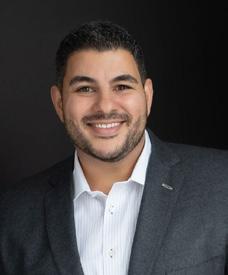
Ed Zeineh CCBA President edwar@zeinehlaw.com
The Clinton County Bar Association (“CCBA”), located in the heart of Michigan, stands as a testament to the enduring commitment of legal professionals to uphold justice, advocate for their clients, and contribute to the community. Established in 1901, the CCBA has evolved into a dynamic and influential organization that not only serves its members but also plays a pivotal role in the broader legal landscape of Michigan.
The CCBA was founded with the aim of fostering a close-knit community of legal professionals who are dedicated to maintaining high standards of practice and ethics. Over the decades, the CCBA has grown both in membership
and in the scope of its activities. From its inception, the association has emphasized the importance of continuing legal education, professional development, and community service.
Today, the CCBA boasts a diverse membership that includes attorneys, judges, and legal scholars. This diversity enriches the association by bringing together a wide range of experiences and perspectives. Members benefit from a variety of resources, including networking opportunities, access to legal research tools, and discounted rates for continuing legal education programs.
The CCBA is particularly known for its collegial atmosphere. CCBA meetings, held at various venues throughout Clinton County, provide a forum for members to discuss current legal issues, share insights, and collaborate on projects. These gatherings also feature guest speakers who address pertinent topics, ranging from changes in state legislation to advancements in legal technology.
As the Clinton County Bar Association approaches its 125th anniversary, it

continues to adapt and grow in response to the changing needs of its members and the community. The association remains steadfast in its commitment to promoting excellence in the legal profession, fostering professional growth, and serving the public.
The CCBA’s enduring success is a testament to the dedication and hard work of its members. Through their efforts, the association not only enhances the practice of law in Clinton County but also contributes to the betterment of society as a whole. In an ever-evolving legal landscape, the Clinton County Bar Association stands as a beacon of integrity, professionalism, and community service.
President: Edwar Zeineh
Vice-President: Alexis Pratte
Treasurer: Matthew Samuel
By Chris Wickman

Chris Wickman cwickman@nicholslaw.net
When I was in elementary school, my class took a school trip to Toronto to see “Phantom of the Opera.” I only knew one small detail about the plot – the chandelier. When the music started, however, I knew every single song and I had no idea why. My mother exercised to the music of Andrew Lloyd Webber in the basement and the heating vent in my bedroom fed musicals to me in my sleep. As an adult, musicals have become my soundtrack to working and driving and I have seen 66 different musicals live to date. We’re very blessed to live in the Greater Lansing area where we have a wonderful professional theater on MSU’s campus – the Wharton Center – in addition to many wonderful local theaters! I have been a season subscriber for several years and I want to provide a preview of this coming year’s musicals coming. I do not work for Wharton nor do I receive any compensation for this - I just want to share my love of
musicals with you. The below opinions are my own only and not the opinions or recommendations of the ICBA or the Nichols Law Firm.
Not every show is for every person, but if you’re looking for a recommendation or have any questions, feel free to reach out to me.
– October 8-13, 2024
Les Mis is a classic musical – sung through, huge musical numbers, highly emotional moments, and a lot of energy – despite its sometimes-tragic subject matter. It follows the lives of a handful of characters over a period of 17 years. These characters include Jean Valjean –a former prisoner on parole on the run from his past – and Inspector Jalvert – the persistent lawman who seeks to return him to incarceration for his crime. Also featured are young romantics such as Cosette, Eponine, and Marius and the backdrop of the Paris Uprising of 1832 and young revolutionaries such as Gavroche and Enjolras. You will cry, laugh, and feel energized drained at the end of this wonderful show.
You may like this musical if you like: The 2012 movie featuring Hugh Jackman, Anne Hathaway, Russel Crowe, Eddie Redmayne, Amanda Seyfriend, and more, classic musicals, or powerful musical numbers.
Chris’s Personal Ranking: #14
SHUCKED – January 21-26, 2025
Shucked is a newer Broadway show from the 2023 Tony’s season. When a small town whose entire identity is centered around corn has their crop threatened, a young woman must venture out of the only place she’s ever known seeking help to save their home. When during her trip to the “big city,” she runs into a con man, drama and comedy ensues as they return to try to save her small town. The hilarious script (book) is at odds with the more heartfelt and powerful musical numbers. It is the Wharton show I’m personally most looking forward to in this coming season despite it also being the show of this season that I saw most recently.
You may like this musical if you like: Puns, one-liners, small towns, comedy, country music, or heartfelt stories.
Chris’s Personal Ranking: #7
MJ – February 11-16, 2025
Based on the real life of Michael Jackson, MJ serves as a snapshot of his life and music in the leadup to Michael Jackson’s 1992 Dangerous World Tour. Featuring classic Michael Jackson songs like, “Bad/2 Bad,” “Don’t Stop Until You Get Enough,” “I’ll be There,” and “Thriller,” the show provides an incredible energy and oftentimes an indistinguishable portrayal of this generational talent.
You may like this musical if you like: Michael Jackson, music you know, impressive dance numbers, and biographies.
Chris’s Personal Ranking: Never seen it – looking forward to the first time!
CHICAGO – April 8-13, 2025
Set in 1920’s Chicago, this musical is a sexy, high-energy show about murder, the women who commit them, and those who love them. The story follows rivals Roxie Hart and Velma Kelly with a background of other (allegedly) merry murderesses alongside a charismatic, manipulative, and loveable defense attorney; the matron of the prison whose salary is largely off the books; and the doting loveable and nearly invisible doting husband. You will laugh, dance, and bop along with this energetic jazz show.
You may like this musical if you like: The 2002 movie featuring Renee Zellweger, Catherine Zeta-Jones, Richard Gere, John C. Reilly, and Queen Latifah, Moulin Rouge, big dance numbers, or jazz.
Chris’s Personal Ranking: #38
HAMILTON – May 21-June 5, 2025
I’m struggling to write this description because everything I try to write ends up just quoting extensively from the
musical. If you really want to know what this musical is about, I would highly recommend looking up the song “Alexander Hamilton” from the musical or put the beginning of the show on via Disney+. Put captions on and enjoy.
For those who want me to do the work: Hamilton tells the story of the life of Alexander Hamilton– one of America’s founding fathers who pulled himself up by his bootstraps based on his intelligence and work ethic. The show follows his strengths and weaknesses, his successes and failures. To me, Hamilton is the most important musical of this century to date. Like Oklahoma, Company, Rent, and others before it, Hamilton expanded what a musical can be and is influencing the next generation of writers. This fast-paced musical is jam-packed with references to musicals, literature, and rap - its main musical style. For those who struggle to follow the speed of the lyrics in rap, I would highly recommend either becoming familiar with the music in advance or watching the Disney+ recording of the original cast so that you enjoy yourself more – and it is still absolutely worth seeing on stage if you enjoy the recording.
You may like this musical if you like:
The Disney+ Recording, Lin Manuel Miranda (In the Heights, Moana, Encanto, Vivo, Tick Tick Boom), History, or Rap.
Chris’s Personal Ranking: #2
THE BOOK OF MORMON –June 19-22, 2025
From the makers of South Park and Avenue Q… Still interested? Good – then go see it but leave the kids at home. In the classic styles of South Park (using vulgarity and parody to highlight poignant messaging), this musical follows the story of two young adult missionaries of the Church of Jesus Christ of Latter-Day Saints – i.e. the Mormon Church – as they head out on their mission to convert new disciples into their church. Despite hoping for a more familiar locale, the two young men find themselves going to Africa where previous missionaries have had limited success. They quickly find themselves very much out of their element and struggle to identify with local residents, who have problems very different than their own, and to bring them into the church. It is a hilarious and offensive show that is not recommended for those with thin skin.
You may like this musical if you like: South Park, social commentary, or laughing.
Chris’s Personal Ranking: #8 –though I’m curious if it changes after the musical was modified in 2020.
The Eaton County Bar Association was created in 1968 to improve the administration of justice, promote reform in the law, maintain a high standard of integrity, honesty, and courtesy in the legal profession, and cultivate a spirit of comradery and fellowship among the members of the bar. Throughout the years, the ECBA has remained an organization devoted to fostering goodwill and positive relationships among members, primarily
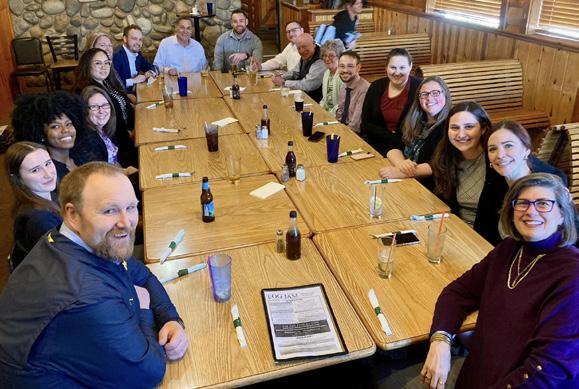
serving as a social organization. The ECBA gives members the opportunity to put down our adversarial roles and instead meet as colleagues and friends to break bread, share stories, and laugh. Our membership consists of roughly 80 attorneys who live or practice in Eaton County, and we welcome individuals from all practice areas and walks of life to join the association, share stories and experiences, and further enrich Eaton County. I currently serve as President (with my term soon to expire), our Vice President is Krystal Pratt, and Daniel Sturdevant serves as our Secretary/ Treasurer. We hold quarterly dinner meetings with a Holiday Luncheon in December and (in theory) a golf outing in the summer.
In my 12 years of membership in the ECBA, what stands out most to me is that despite differences of opinion in the courtroom, ECBA members instantly set aside those differences during association meetings and simply enjoy each other’s company. The ECBA provides a chance to shed the oftentimes-formal walls that every attorney puts up and enjoy the spirit of comradery amongst members. Everyone needs a chance to unwind, attorneys more than most, especially considering ever-increasing workloads and stress levels. The ECBA offers an opportunity to so in an informal setting while also networking with fellow attorneys and judges. Whether it’s sharing war stories over dinner, giving a send-off to a retiring member, or listening to quick legal updates given by members, I have always enjoyed the association’s closeknit and welcoming membership. If you feel that you would like to join the association, just contact either myself, Krystal, or Dan, and we’ll see you at the next meeting.
Please take note that the Ingham County Bar Association does not do Lawyer Referrals. If you need to use this service provided by the State Bar of Michigan, please call them at (800) 968-0738 between the hours of 9:00 a.m. and 5:00 p.m., Monday through Friday, to speak with a lawyer referral representative or you can use the links below.
• Lawyer Referral and Information Service Registration Form
• LRIS Quick Reference Guide
• Become a Lawyer Referral Service Panel Member
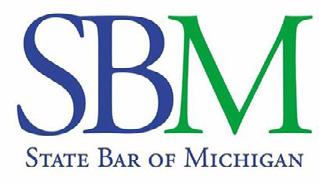
By William Frank Diedric

William Frank Diedrich theroadhome@comcast.net
Grief is a unique emotional state because it includes so many other emotions. Hurt, sadness, anger, guilt, resentment, and many other feelings can make up this cocktail we call grief. When it comes to grief, I focus on love—the love you received from the person who passed (even if it wasn’t much) and the love and appreciation you feel for the person who passed.
Recently my mother passed away. She was 93, and she had been living with dementia for five years. Thinking back I appreciate the lessons in love I learned from my relationship with my mom.
I grew up in a home where the words I love you were never spoken. My mother had two sides to her. There was this loving side that was generous and caring. The other side was all drama— complaining about other people, what they had done to her. As children my
sisters and I were constantly corrected. Our home was always clean and neat, and we were expected to do our part. If we did not do our part we heard about it. I did not bring friends home because my mother would humiliate me by yelling at me in front of them.
Yet, I somehow knew she loved me. At age twelve, I was sitting in church one Sunday. As we rose to sing a hymn, I looked at my mother standing nearby, and I was taken aback by her beauty. At age twelve, I had no words to express what I saw and felt that day. The love I felt was overwhelming.
At age twenty, while a college student, I gave my mother a special Mother’s Day card. In the card I expressed my appreciation for her with some degree of eloquence. She cried when she read it. She cried for days afterward. I think she had waited twenty years to receive that appreciation.
At age thirty, I learned my mother was scheduled for a hysterectomy. I lived over 100 miles away. I called her the night before out of concern. We talked, and as our conversation came to a close I said the words that had never been exchanged between us: “I love you, Mom.” She told me that she loved me, too. When I hung up the phone (in those days we actually did hang up the phone.) I sobbed, uncontrollably. That I love you had been imprisoned in me for thirty
years, and now it was finally free. After that my mom always told me she loved me whenever we spoke. She also began telling my siblings she loved them.
My mother and I developed an honest and loving relationship after that. When she complained about my siblings I spoke directly to her about it, asking her to work out her differences rather than just complaining. When it came time to move out of her home and into an independent living apartment where she had access to care, I sat down with her and we talked about it. I had been adamant about not forcing my mother to move. Instead, I offered my observations and asked her to at least look at some facilities. We took her to two places, and she chose one.
After several months, she wandered off one morning and was lost. We then moved her into Assisted Living where the doors were locked, and she had 24-hour care. Near the end she became mostly nonverbal but still aware.
One day my sister and I were talking about forgiveness. Mom was sitting there, in and out of consciousness. This sister had many difficult times in the past with our mother. My mother had been very critical of her, and at times just plain mean. They went through periods of time when they did not speak to each other. Yet, this sister had stepped up and taken care of our mother for the
Words to Consider continued past ten years. She did most of the work, managed Mom’s finances, visited her twice per week, and more.
I talked about the importance of forgiveness. My sister countered saying it was very difficult to forgive someone when they weren’t sorry. I stated it was important to forgive anyway, that forgiveness is for the one who forgives. It is how you let go of the pain. She again made her point about how difficult that was. I agreed it was difficult, and we continued our discussion for a few more minutes. We did not name names or speak of any specific situation.
Two weeks later, after spending the day with our mother, I said good-bye and left the room. A few minutes later my sister met me in the parking lot. “Mom spoke to me. She said two words.” I asked her: “What were the words?” My sister replied: “She said I’m sorry.” “What a gift that was!” I offered.
The next week we were again with my mother, and she was failing. I knew her time was soon. We made sure my three sisters and my half-brother all spoke to her that day. I wanted her to know we all loved her. Two days later one of my sisters had flown in from out of state. My third sister was readying herself to fly in at a moment’s notice. Two of my sisters spent the day with our mother then took a break for dinner. During that time, I received a call from Hospice. They told me my mother had passed.
It was a gut punch. Even though I knew it would happen, it still took me by surprise. I choked up. My wife and I had been on our way out to dinner, and I couldn’t go. I started making phone calls.
Over the next few days, I felt lifted up by love. Thinking about my mother I was filled with love and gratitude for her, for her life. I loved everyone and everything. All of my judgments and opinions dissolved, and I saw only the best in each person. I lived in a bubble of love. I find this aspect of grief to be incredible. Rather than sadness, hurt, guilt or regret, there was only love. Since those few days I know I always have access to that state of love. I just need to call upon it. I just need to remember my mom.
As the executor of my mother’s estate, it was up to me to plan the funeral, and the family gatherings. All of that went well. It was also my role to make sure her bank accounts and investments were distributed according to her will and the beneficiaries listed on her accounts. I organized a meeting with my mother’s financial advisor and my four siblings. We all heard the same message at the same time. It was then up to each of us individually to decide what to do with our inheritances.
There was zero conflict amongst us, even though two of my sisters haven’t spoken to each other in twenty years. The will was clear and my mother was always big on fairness. Several years ago, I visited a bank with my mother to make sure all
accounts had beneficiaries listed. I told the bank representative that there would be no conflicts over money in our family.
She stated that our family would be unusual then, because 80% of the families she knew all had conflict over money. Instead, we were all grateful our mother loved us enough to provide for us. We were all aware that it wasn’t our money to begin with. It was hers. Therefore, whatever we received was a gift. When I think about the money I feel love—the love my mother gave us. That and gratitude is all I feel.
Grief is a complicated emotional state. It can bring sadness, guilt, regret, anger, resentment, disappointment, and many other emotions. The important thing is the love. Draw out your love for the person who passed, and loving yourself enough to not sink into the depths of anger and conflict over material goods and money. Focus on the love. Focus on what you learned from the person who passed. Let yourself feel whatever comes up. Accept other family members as they are, and choose love. You have to feel whatever comes up in order to heal it. Then let it go as best you can.
William Frank Diedrich is a speaker, executive coach, group facilitator, and the author of ten books. His newest book, The Practice of Letting Go, is available at his website: http:// humanadulthood.com
By April Alleman, Succession Planning Program Counsel, State Bar of Michigan
New requirements for Michigan private practice attorneys effective September 1, 2023. Read the Supreme Court Order here. Required information will be collected during license renewal beginning the 2023-2024 Bar Year. Although not required until September, starting this summer, attorneys can nominate their designated interim attorney through the State Bar of Michigan’s online Member Area
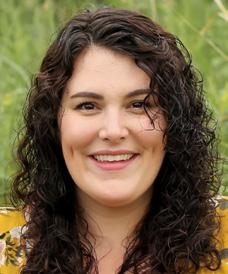
April Alleman aalleman@michbar.org
License renewal for the 2023-2024 Bar Year is complete and active Michigan attorneys have completed their Rule 21 planning requirements.
So what happens next? Hopefully the next time you see anything about interim administrator planning it will be during the 2024-2025 license renewal. However, what if the attorney you agreed to serve as their interim administrator for becomes unable to practice? Or what if you become unable to practice and are in need of your interim administrator?
Completing your Rule 21 plan was an important step, however, there are additional things that can be done to ensure that your practice is ready for any unexpected inability to practice. Think about how your family, staff, colleagues, and interim administrator will feel if something happens to you and instead of organized chaos (and sometimes disorganized chaos) there is a direct plan of action, step-by-step instructions on how to access your files, what your color coded files mean, where your active case list is kept, where your calendar is, who has knowledge of your book keeping, and so on. You are the best person to explain how your practice is run; however, when you are unable to give direction due to some temporary or permanent inability to practice, arming someone else with the necessary knowledge is going to determine the success of your interim administrator’s appointment and their ability to properly assist your clients and your practice.
Taking the time to figure out what information is needed to implement a successful interim administrator plan is important. It takes time and resources now, but the benefit of having this information when needed greatly outweighs the headache to complete now.
Resources to prepare your practice are available under the Rule 21 resources page under Succession Planning: https://www.michbar.org/pmrc/successionplanning/resources.
Contact Info: Email: IAP@michbar.org 517-346-6355 www.michbar.org/Rule21

Teresa Tran-TenBrink
Teresa.Tran-Tenbrink@LibertyMutual.com
Tran-TenBrink is a trial attorney with the Law Offices of Grieg, Kennedy, Seifert, and Fitzgibbons with Liberty Mutual Group Field Legal Offices in the Southfield, Michigan office.
Attorney Tran graduated from Michigan State University with a Bachelor of Science in 2014. She received her Juris Doctor cum laude from Western Michigan University Cooley Law School in 2021.
Following law school, she worked in high level state government in Illinois
specializing in ethics, harassment, and discrimination and then as assistant legal counsel in the warranty industry where her work focused on product development as well as corporate compliance and governance matters.
Attorney Tran is a member of the Chicago Bar Association, Asian American Bar Association of Chicago, Michigan Asian American Bar Association, and Phi Delta Phi Legal Honors Society. She sits on the board of the Ingham County Bar Association’s Young Lawyers Section, Vice President of Membership for the Junior League of Lansing, and serves as a mentor to law students.
1.) Where do you work and what do you do there? Liberty Mutual Insurance Company; personal injury litigation.
2.) Where did you go to school? WMU Cooley Law School.
3.) When were you admitted to practice in Michigan? 2023.
4.) Why did you go into the legal field? I love being an advocate and think it’s a lot of fun to understand information differently than others.
5.) What advice do you have for those considering law school? Law school is hard, so have a strong work ethic and be committed to doing your best. Understand that at the end of the day your best is definitely good enough. Also, preparedness is important. Those of us who want you to do well in the profession are more than willing to give you our time. Tap into that as a resource -- connect with attorneys, ask us about our jobs, ask us for direction, etc. We were all there once and you don’t have to figure it out by yourself.
6.) If you weren’t a lawyer, what would you do? Archaeologist!
7.) Where did you grow up? Lansing.
8.) Who is your biggest role model and why? All the women in my life are my role models. They have all made a positive impact on my life in different ways. My spirit and confidence is made up of a little bit of each of them. A strong support system, especially as a woman by other women, has helped me be who I am today.
9.) What do you do in your free time? Eating, traveling, fitness, watching/ reading crime dramadies (funny but also
serious? murder/mysteries), and playing games on my Nintendo Switch. I have made it to several parts of Africa, Asia, Europe, and Central America/islands in the Carribean. My last meal on Earth would be Vietnamese food, which is what I grew up on. I am an avid Orange Theory Fitness goer and enjoy high intensity athletic training.
10.) Do you have any pets? If so, tell us about them. I don’t have any pets and I’m actually not a pet person in general. In another life, I would probably be a cat person. But I’m actually allergic.
BRIEFS Committee Meetings
Author and Article Pictures
Article Length and Format
• Raising the Bar announcements:100-200 words
• Local legal events notices:100-150 words
• Columns: 300-500 words
• Articles: 700-1,000 words
• Submit articles in a Word .doc/.docx
By Alexander S. Rusek

Alexander S. Rusek alexrusek@gmail.com
In 1991, the Governor’s Task Force on Children’s Justice was formed to “respond to the challenges involved in cases of child abuse and neglectparticularly child sexual abuse-in Michigan.”1 The task force’s efforts resulted in the first edition of the State of Michigan Governor’s Forensic Interview Protocol (“Forensic Interview Protocol”) being published in 1998.2 The goal of a forensic interview conducted in accordance with the Forensic Interview Protocol is “to obtain a statement from a child—in a developmentally sensitive and unbiased manner—to support accurate and fair decision-making in the criminal justice and child welfare systems.”3 Recently published, the newest edition of the Forensic Interview Protocol (“Fifth Edition”) attempts to provide refined and additional tools to investigators when forensically interviewing children.4 As such, lawyers practicing in the areas of criminal defense, juvenile justice, family law, childhood abuse and neglect, and other
areas should take note of the Fifth Edition.
Renamed in 2010, today the Governor’s Task Force on Child Abuse and Neglect is charged with: “(1) Review[ing] and evaluat[ing] State investigative, administrative and both civil and criminal judicial handling of cases of child abuse and neglect, including child sexual abuse and exploitation, as well as cases involving suspected child maltreatment related fatalities and cases involving a potential combination of jurisdictions, such as intrastate, interstate, Federal-State, and StateTribal; and (2) Mak[ing] policy and training recommendations [related to child abuse and neglect]. The Task Force may make such other comments and recommendations as are considered relevant and useful.”5
Under MCL 722.628(6), every county “must develop and establish procedures for involving law enforcement officials and children’s advocacy centers, as appropriate, as provided in this section. In each county, the prosecuting attorney and the department must adopt and implement standard child abuse and child neglect investigation and interview protocols using as a model the protocols developed by the governor’s task force on children’s justice as published in FIA Publication 794 (revised 8-98) and FIA
Publication 779 (8-98), or an updated version of those publications.”6 A model child abuse and neglect protocol is available from the Michigan Department of Health and Human Services.7
From 1998 to 2017, the Forensic Interview Protocol had four editions published.8 Recently, the Fifth Edition was published. “The interdisciplinary groups that assembled each edition aimed to give children a voice by promoting child-centered, evidencebased guidelines for asking children about their lives []. The foundation of this protocol is a common framework for information gathering interviews that helps individuals of all ages share difficult information while minimizing the potential for misunderstandings.”9
While a comprehensive review of Forensic Interview Protocol caselaw is beyond a scope of this article, practitioners should take note that Michigan courts have held that: (1) Statements made by a child during a forensic interview are hearsay and not admissible under MRE 803A (“Hearsay Exception; Child’s Statement About a Sexual Act” aka the “tender years” exception) unless the conditions of MRE 803A are met or another hearsay exception applies;10 and (2) Statements made by a child during a forensic interview are admissible in parental rights termination trials under MCR 3.972(C) (2)(a) and under MCL 712A.17b during non-adjudication stages of parental rights termination proceedings.11
In the Fifth Edition, the Governor’s Task Force on Child Abuse and Neglect sets forth that “First, forensic interviews are child-centered. Although interviewers guide the flow of conversation, children should determine the vocabulary and specific content of conversation as much as possible. Forensic interviewers should avoid suggesting events and details that have not been mentioned by children or projecting adult interpretations onto situations (e.g., do not say, “That must have been frightening”);” “Second, forensic interviews test alternative hypotheses (explanations) about the meaning of children’s reports and origin of abuse allegations;” “Third, forensic interviews support broader information gathering efforts by exploring topics that might lead to corroborative evidence;” and “Finally, this protocol describes guidelines for exploring whether children have been victims of maltreatment.”12
The Fifth Edition of the Forensic Interview Protocol provides several noticeable changes. First, the Fifth Edition presents the reader with an easier to read, reference, and implement format (e.g. using color and graphics throughout the publication and using footnotes instead of in-text citations and end notes.). Second, the Fifth Edition includes a condensed overview of an interview, which is a two-sided quickreference guide for interviewers. Third, the Fifth Edition, in addition to its narrative, provides textboxes containing example dialogue and questions for interviewers’ easy reference. Fourth, terminology in the Fifth Edition has been updated and encourages “interviewers to use many types of invitations” when
forensically interviewing children. Finally, the Fifth Edition includes other minor updates, which are outlined in the Crosswalk published by the Governor’s Task Force on Child Abuse and Neglect.13
Perhaps one of the biggest changes to the Fifth Edition comes in the form of the overriding features of a forensic interview. Previously, the Forensic Interview Protocol identified two overriding features of a successful forensic interview: (1) A child-centered approach to forensic interviews; and (2) Hypothesis testing.14 In the Fifth Edition, the protocol now also calls for “exploration of topics that support broader information gathering efforts.”15
Another notable change in the Fifth Edition comes in the form of expanded ground rules and instruction to be given the child being forensically interviewed. The Fourth Edition established four primary ground rules for forensic interviewers to establish with the child: (1) “Don’t Guess;” (2) “Tell Me If You Don’t Understand;” (3) “Correct Me If I Make a Mistake;” and (4) “Tell the Truth.”16 The Fifth Edition expands and clarifies that the forensic interviewer should deliver five instructions to the child: (1) Don’t Guess;” (2) Tell Me If a Question Doesn’t Make Sense or You Don’t Understand the Question;” “Correct Me If I Make a Mistake;” “I Don’t Know the Answer to Questions I Will Ask;” and “Promise to Tell the Truth (without using the word ‘lie’).”17
The Fifth Edition seeks to make it clear that interviewers “can customize instructions to meet individual children’s needs (e.g., very young children, children with intellectual disability). The word ‘lie’ can be intimidating and is not
used in some popular protocols.”18 The Fifth Edition also addresses a number of special topics not addressed, or not as fully addressed, in previous editions, such as Tele-Forensic Interviews,19 Trafficking,20 Interpreter-Assisted Interviews,21 and additional sample questions by information type.22
Practitioners should acquaint themselves with the Fifth Edition of the Forensic Interview Protocol to be prepared to effectively address statements made by children during forensic interviews.
The Fifth Edition of the Forensic Interview Protocol is available online at: https://www.michigan.gov/mdhhs/-/ media/Project/Websites/mdhhs/Adultand-Childrens-Services/Abuse-andNeglect/Childrens-Protective-Services/ DHS-PUB-0779-Fifth-Editionpdf96&h ash=9F061F32F82538F47A1DB3D254 0A68C1 (Endnotes)
1 See State of Michigan Forensic Interview Protocol, 5th Edition, at i.
2 Id. at i.
3 Id. at 1; see also People v Katt, 468 Mich 272; 662 NW2d 12 (2003).
4 Available at https://www.michigan.gov/ mdhhs/-/media/Project/Websites/mdhhs/Adultand-Childrens-Services/Abuse-and-Neglect/ Childrens-Protective-Services/DHS-PUB0779-Fifth-Edition.pdf?rev=f9aff8fcc0a847bc9ae6ff72a7c5ec96&hash=9F061F32F82538F47A1DB3D2540A68C1.
5 See https://www.michigan.gov/mdhhs/adultchild-serv/abuse-neglect/childrens/governorstf
6 MCL 722.628(6).
7 Available at https://www.michigan. gov/mdhhs/-/media/Project/Websites/ mdhhs/Adult-and-Childrens-Services/ Abuse-and-Neglect/Childrens-Protective-Services/DHS-Pub-794_206830_7. pdf?rev=8321a6b0523247148c655cc19762687a&hash=4B591A40CC46C0F69578A1849C645E26.
8 See State of Michigan Forensic Interview Protocol, 5th Edition, at 2.
9 Id. at i.
10 People v Douglas, 496 Mich 557, 575; 852 NW2d 587 (2014).
11 In re Martin, 316 Mich App 73, 83; 896 NW 2d 452 (2016).
12 See State of Michigan Forensic Interview Protocol, 5th Edition, at 2.
13 Available at https://www.michigan. gov/mdhhs/-/media/Project/Websites/ mdhhs/Adult-and-Childrens-Services/ Abuse-and-Neglect/Childrens-Protective-Services/5th-Edition-Crosswalk. pdf?rev=d647dac5d903476d89934b951ca92b35&hash=23DAB88DC136DB81741C44E899D8B72D
14 Id.
Hooked, 3142 E. Michigan Ave, Lansing Coffee/Wine/Books & Networking
5:30 p.m. - 6:30 p.m.
Registration is not required - just show up!
Open to Judges, attorneys, law students, and court staff!
Save the Dates: Wednesday, September 18, 2024 Wednesday, November 20, 2024

By Chris Wickman

Chris Wickman cwickman@nicholslaw.net
If you have Facebook, you’ve seen this status or maybe posted it yourself. This article helps explain how this happens, how to avoid it happening to you, how to tell if a friend has been hacked, and how to avoid giving the hackers what they want.
If someone’s Facebook has been hacked, the person is posting as them on their already established account. They may change the name of the profile, delete the past activity, change the email address, start talking only about cryptocurrency and how rich it’s making people, etc. Usually this happens when someone guesses or discovers your password – usually through a data leak online. If someone is hacked, they need to try to recover or shut down the account by doing the recovery process through the registered email address, etc. or by contacting Facebook directly.
For Google accounts, you can go to the Google Password Checkup and login to see if any of your passwords are compromised. Online password safety is beyond the scope of this article, but is very important to staying safe online.
More often than not, what people actually call being hacked is actually someone imitating them on Facebook – using their pictures, friending their friends, and pretending to be them. What scammers (not hackers) are doing when they are duplicating you is using your publicly-available information to set up a profile to “be” you. What they then do is friend all your friends and initiate conversations with them eventually asking for money, etc. This is NOT being hacked as you still control your own Facebook profile, but that does not mean that you cannot do anything to protect yourself.
Scammers cannot use your picture and know your friends to pull off this duplication unless you make that information publicly available to strangers – or add strangers as friends which may be a bad idea anyway unless you like getting tagged in ads selling fake Rolexes. To control who can see your pictures, friends list, etc., login
to Facebook and click on the small version of your profile picture in the top right corner and click on “Settings and Privacy.” Then click on “Privacy Checkup.” Click on “Who can see what you share.” This opens up a lengthy list of personal information that is on Facebook and next to each, it indicates whether such is shared with the Public (anyone who can see your page even if not friends), Friends, Only Me (You), or some other group. Feel free to independently toggle such as you see fit, but make sure not to get tired before the end category titled, “Friends and following.” If you don’t want someone imitating you to your friends, you will want to consider limiting your friends list to Friends (or Only Me if you add strangers on Facebook). This will stop strangers from seeing your Facebook friends so that even if they make themselves look like you, they won’t know who to add as a friend to try to scam money from using your persona.
If you get a friend request from someone you think you’re already friends with, they either lost their previous Facebook for some reason and are starting over or they are being duplicated. If you accept their friend request (which isn’t a problem in itself), they usually will
quickly message you on Facebook with some innocuous message asking how you’ve been, etc. before getting into asking if you can help them out with money. This is why scammers do this – to scam money. The best question that I’ve found to figure out quickly if this is your friend or a scammer is to ask, “How do we know each other?” A scammer will have no idea how to answer this simple question and oftentimes will just abandon the conversation without answering trying to find easier targets who aren’t already skeptical.
If you figure out that the new profile is fake, you can do a few things to help your friend:
1. Tell them on their real profile or not through Facebook (telling the fake Facebook that they’re fake isn’t helpful). Sending them the advice in this article is also helpful potentially;
2. Warn others – post on their wall, comment on a post they’ve made, etc. The scammer will usually quickly delete such, but it may be helpful for others to see;
3. Go to their profile, click on the three dots below their profile picture on the right side, and click “Find support or report.” Select “Pretending to be someone” and “A friend” and then find the profile of the real person by starting to type in that person’s Facebook name. Facebook tends to investigate these fake accounts quickly and usually they’re shut down within a few hours.
Finally, under no circumstances do you give the scammer money. That’s what they want and that’s what they’re after – even if they admit they’re scammers and give you some sob story about why they need money. Scammers do this because they sometimes do make money doing this and whether you’re tricked or whether you’re charitable, let’s not let them learn that they can make money this way.
ICBA may offer scholarships to prospective members who may be experiencing a hardship and cannot pay the standard rates to be an active member of the Bar.
Recipients will remain anonymous. It is up to the discretion of the ICBA President to grant scholarships, but it can only be approved on an annual basis (i.e. this is not a benefit that automatically renews year-to-year).
The scholarship application can be accessed here .
By Stephen Sinas and Kevin Komar, Sinas Dramis Law Firm
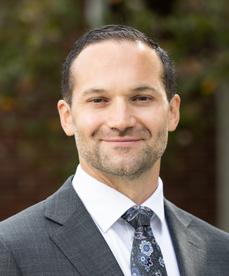
Stephen Sinas Sinas Dramis Law Firm stevesinas@sinasdramis.com

Kevin Komar
Sinas Dramis Law Firm
kevinkomar@sinasdramis.com
A Judgment for over $2.8 million was recently entered in the no-fault case of the Estate of Kevin Lindsey, et al v Esurance Insurance, which, after a trip to the Court of Appeals in 2021, has been pending in the Ingham County Circuit Court since 2017. The Judgment was entered against Esurance following a jury verdict in favor of plaintiffs, obtained by Sinas Dramis Law Firm attorneys Stephen Sinas and Kevin Komar. The dispute in the case was whether Kevin Lindsey was intending suicide and/or injury when he opened the front passenger door and left the moving motor vehicle he was riding in while he was arguing with his longtime girlfriend and mother of his three children, Chelsea, who was driving the vehicle.
Under the Michigan No-Fault Law, nofault insurers must pay no-fault personal protection insurance benefits regardless of whether the injured person was negligent or even reckless in sustaining their injuries. Under MCL 500.3105(4), however, no-fault insurers do not have to pay no-fault PIP benefits if the insurer can prove that at the time of incident, the
person committed an intentional act with the subjective intent to commit suicide or suffer injury.
In the Lindsey case, to prevail on the intentional injury defense, Esurance had the burden of proof at trial on two separate issues. First, Esurance had to prove it was more likely than not that Kevin intended to leave the moving motor vehicle, as opposed to inadvertently falling out. Second, Esurance had to prove it was more likely than not that Kevin intended to leave the vehicle with the subjective intent to die or suffer injury.
The trial took place over the course of a week. During the trial, Chelsea testified that on November 26, 2016, she and Kevin were intensely arguing as she drove her Chevrolet Tahoe westbound on Lake Lansing Road back to the couple’s home. Kevin was riding in the front-seat passenger seat while the couple’s twoyear-old son was riding in the backseat. As the couple argued, Chelsea drove the vehicle westbound on Lake Lansing Road towards the roundabout at the intersection of Lake Lansing Road and Chamberlain Road. Chelsea testified that as the argument intensified, she screamed to Kevin, “I want you out of my life! Kevin yelled back, “Fine. F@#k it!” and opened the passenger door and left the moving vehicle. Chelsea testified that she was not entirely sure how Kevin exited the vehicle and that “it was like he was there and then he was gone.”
Cheslea further explained that at the time of that exchange, she was slowing the vehicle down from its estimated traveling speed of about 30-35 mph. After leaving the vehicle, Kevin fell onto the pavement sustaining catastrophic injuries, including severe traumatic brain injuries. Kevin fought for his life for over 9 months and then tragically died, leaving his three children without a father.
At trial, Esurance could not produce any direct evidence that Kevin subjectively intended to die or suffer injury. Rather, Esurance mainly relied upon its argument that based on the circumstantial evidence of Kevin leaving the vehicle while it was moving, it was clear that he subjectively intended to suffer injury. Notably, during the trial, it came out that Esurance’s claim adjuster believed that Kevin was intending to commit suicide when he left the vehicle, but the adjuster’s supervisor had the different belief that Kevin was just intending to suffer a non-fatal injury to garner sympathy from Chelsea in midst of their heated argument. Esurance did not present any other lay or expert testimony to support their differing theories about Kevin’s subjective intent.
Plaintiffs presented testimony from Kevin’s family members and friends who confirmed that Kevin had never sought to kill or injure himself at any point in his life. They also confirmed that Kevin deeply loved his three children and was a dedicated father to all of them. Kevin’s brother, Byron,
added that because he and Kevin had an alcoholic father who left them when they were growing up, he and Kevin made a previous pact with each other that they would always be there for their own children. Byron thus explained it would make no sense for Kevin to suddenly try to kill or hurt himself in such a way that would jeopardize his ability to be there for his children. Plaintiffs further emphasized how it was undisputed that Kevin left the moving motor vehicle as it was slowing down for the roundabout up ahead, which thereby made it plausible that Kevin mistakenly believed he could get out of the slowing vehicle and get away from Chelsea without getting injured. Plaintiff also presented expert testimony from Ingham County Medical Examiner, Michael Markey, M.D., who confirmed that in his official role as Ingham County’s Medical Examiner, he determined that Kevin’s death from his injuries was more likely the result of an “accident”. Moreover, Plaintiffs presented expert testimony from a forensic psychiatrist who explained that it was very unlikely Kevin was intending to commit suicide or suffer injury, given that Kevin’s life did not include any history of suicide or self-harm, and that he possessed many of the known psychological factors that would protect him against those tendencies, such as his stable daily life, his love for his three children and extended family, and his plans for his own future.
After a week of trial, the jury took less than an hour to deliberate before reaching their verdict. The jury
ultimately decided against Esurance. The jury determined that while they believed Kevin intended to leave the vehicle (as opposed to falling out), he did not do so with the subjective intent to die or suffer injury. Following the verdict, Judgment was entered against Esurance exceeding $2.8 million dollars that includes full payment of the nofault benefits at issue and the related claims for no-fault penalty interest and judgment interest. The Judgment proceeds have been used to fully pay Kevin’s medical providers and to provide significant financial support for Kevin’s three children.
The Lindsey case shows that when a no-fault insurer attempts to go to trial on the intentional injury defense under MCL 500.3105(4), the trial will be intense and emotional, and that jurors will scrutinize the no-fault insurer’s accusations of suicide or selfinflicted harm. Furthermore, the jury’s unanimous verdict in the Lindsey case shows how jurors will rule against nofault insurers on the intentional injury defense when the no-fault insurer’s only support is their own speculative theories and circumstantial evidence regarding the injured person’s subjective intent.
In addition to Stephen Sinas and Kevin Komar handling the case at trial, Sinas Dramis Law Firm attorneys George Sinas and Joel Finnell have provided invaluable scholarly support regarding the legal issues in the case throughout the seven years it has been litigated.
Thank you to the Sponsors
Abood Law Firm
Buhl Little Lynwood & Harris PLC
Chartier & Nyamfukudza PLC
Clark Hill PLC
Dykema Gossett PLLC
Fahey Schultz Burzych Rhodes PLC
Foster Swift Collins & Smith PC
Fraser Trebilcock Davis Dunlap & Cavanaugh, P.C.
Thank you to the committee and volunteers for all their hard work!
Shrimp Committee
Elias G. Kafantaris
Alexander Rusek
Michael Van Huysse
Volunteers
Pamela Amato
Hon. Lisa Babcock
Kim Eddie
Heather Lamb
Victoria Osburn
Karen Poole
Scott Storey
View photos from the event
Grewal Law PLLC
Mallory, Lapka, Scott & Selin, PLLC
Murphy & Spagnuolo PC
Sinas, Dramis, Larkin, Graves & Waldman P.C.
Speaker Law Firm PLLC
SuperiorX Investigations
Warner Norcross & Judd LLP
Willingham & Cotè PC
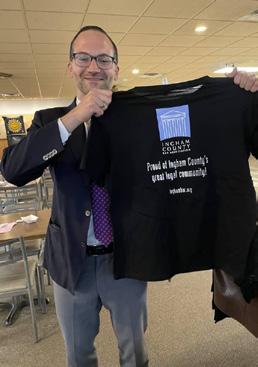

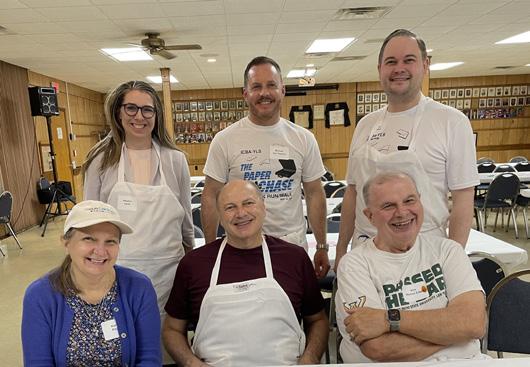
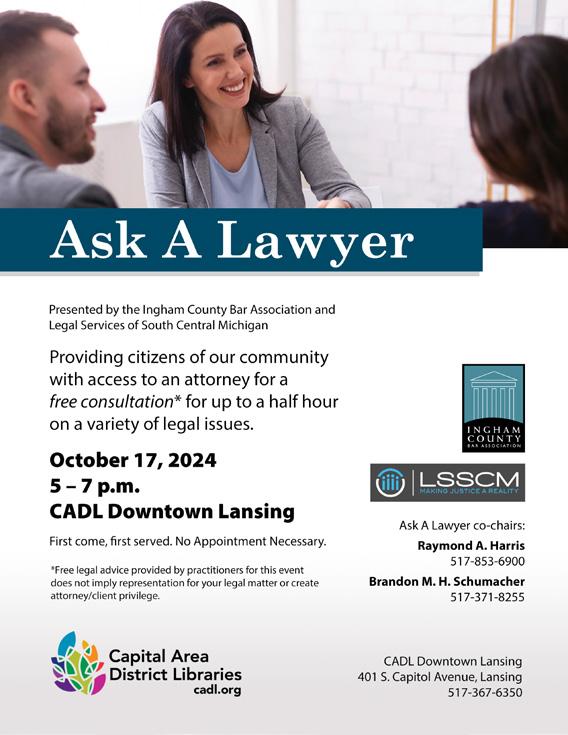
March 13, 2024
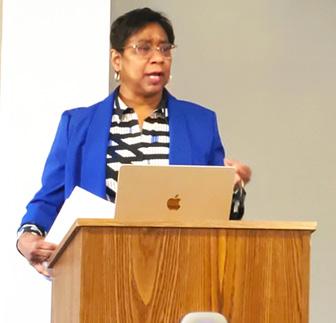
The Hon. Shauna Dunnings and Ryan J. Buck, the Ingham County Court Administrator/Probate Register, both spoke at the March 13 meeting of the ICBA Probate Section. One important point from the meeting: when giving documents to probate court staff, do not use staples on documents. For judges’ copies, use staples.
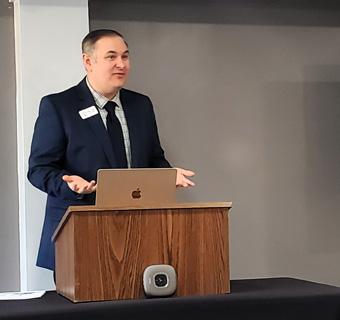
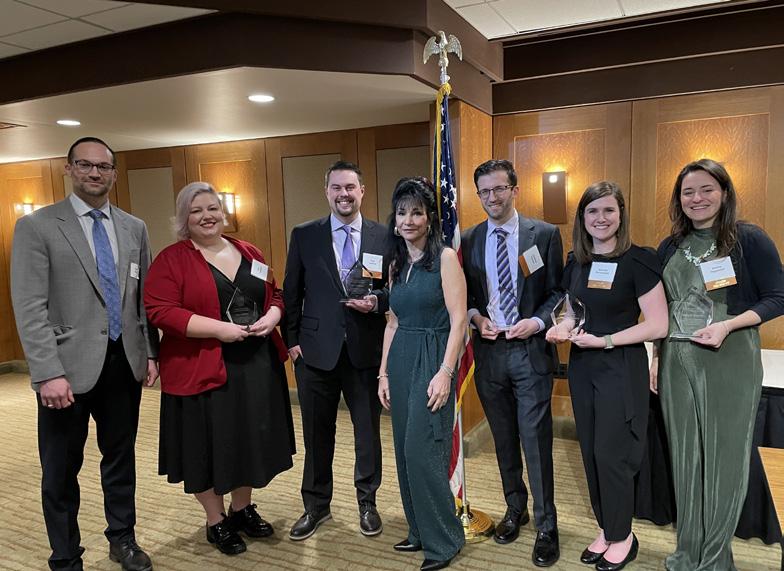
Click here to View photos from the event
Abood Law Firm
Above The Bar Marketing
Alane Family Law PC
Blanchard & Walker PLLC
Buhl Little Lynwood & Harris PLC
Capital Region Community Foundation
Chartier & Nyamfukudza PLC
Clark Hill PLC
Dickinson Wright PLLC
Dykema
Fahey Schultz Burzych Rhodes PLC Fortz Legal
Foster Swift Collins & Smith PC
Fraser Trebilcock Davis & Dunlap PC
Grewal Law PLLC
Ingham County Prosecutor’s Office
Mallory, Lapka, Scott & Selin, PLLC
Miller Canfield Paddock and Stone, PLC
Thank you to all of our generous 15th Annual Barristers Night Sponsors:
Abood Law Firm
Chartier & Nyamfukudza PLC
Clark Hill PLC
Fahey Schultz Burzych Rhodes PLC
Foster Swift Collins & Smith PC
Fraser Trebilcock Davis & Dunlap PC
Grewal Law PLLC
Murphy & Spagnuolo PC
Miller Canfield PLC
Sinas Dramis Law Firm
Speaker Law Firm PLLC
SuperiorX Investigations
Warner Norcross & Judd LLP
Willingham & Cote PC
University Club of MSU
Murphy & Spagnuolo PC
Resolution Services Center
Sinas, Dramis, Larkin, Graves & Waldman P.C.
Speaker Law Firm PLLC
SuperiorX Investigations
Warner Norcross & Judd LLP
Willingham & Cotè PC
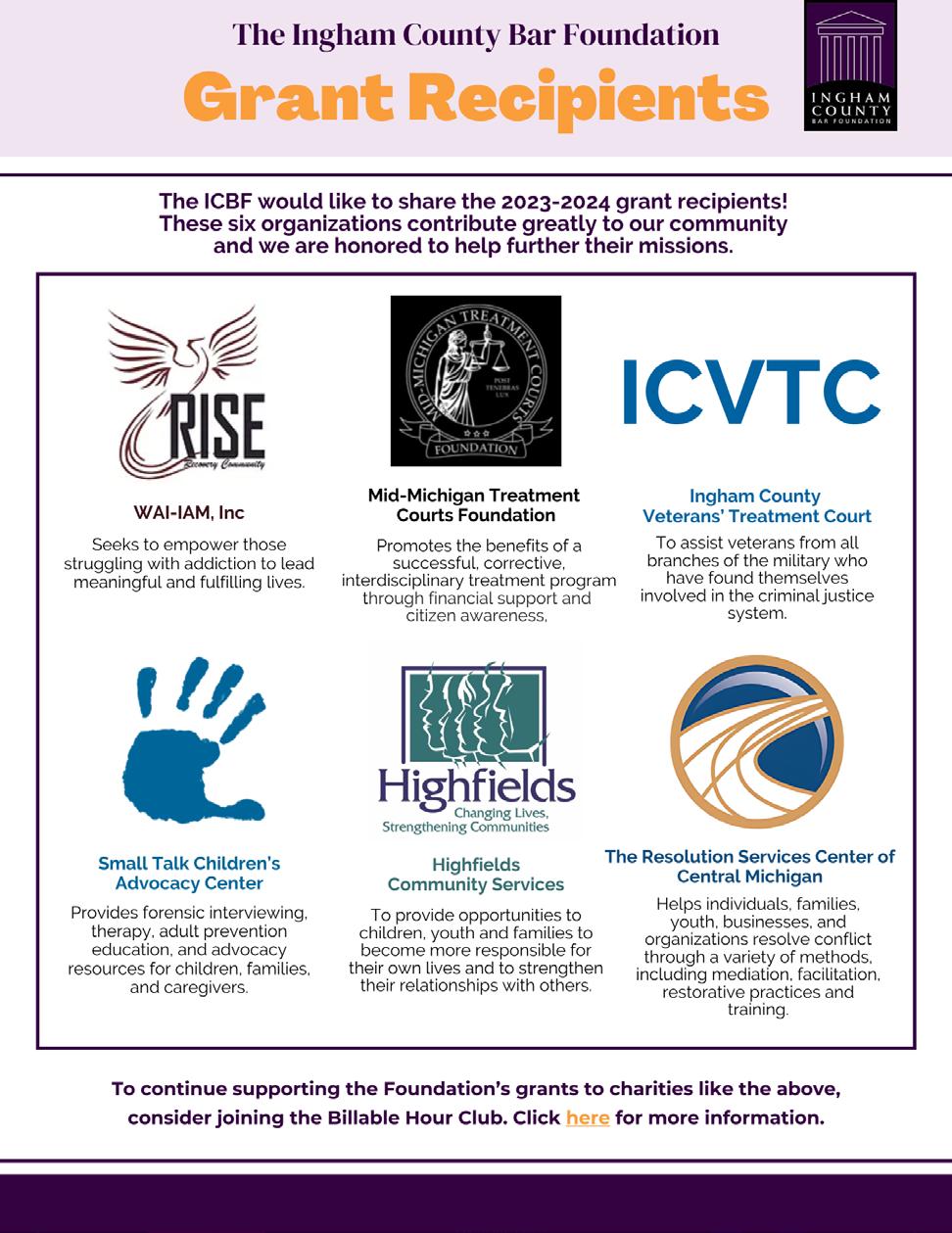
The Bankruptcy Law Section meets at noon on the fourth Thursday of each month (Quarterly – September, December, May) at Noon, Location: Zoom.
Upcoming Meetings:
• TBA
Please feel free to join the Bankruptcy Section for its monthly meetings. Contact Section Chair Lynn Osborne for details.
To RSVP for meetings, contact Lynn Osborne at lynnosbornepc@gmail.com
The Criminal Defense Law Section is comprised of criminal defense attorneys who defend people accused of committing crimes. The Section is dedicated to sharing knowledge related to emerging and important topics specific to criminal defense. The Section is also committed to offering opportunities for attorneys to hone critical skills needed to defend those accused by the government.
If you are looking for a way to learn about the latest in forensics or practice your evidentiary knowledge, they you’ll want to join
this section. If you have suggestions for future topics, please contact Section Co-Chairs Marisa Vinsky, Takura Nyamfukudza or Christopher Wickman.
Upcoming Meetings: Dates/Times will vary and will be announced via Listserv - Location: Zoom
There is no cost to attend meetings. Speakers and topics will be announced. To RSVP for the Criminal Defense Law Section meetings, email Chris Wickman at cwickman@nicholslaw.net
The Employment and Labor Law Section holds its meetings from noon to 1 p.m. each month at WMU-Cooley Law School, 300 S. Capitol Ave., Room 911, in downtown Lansing.
Section Chair is Kelly McClintock. Contact Kelly if you have ideas for topics and speakers.
Upcoming Meetings: 4th Tuesday of the month – Noon, Location: TBA
If you have questions about Section meetings, please email Kelly at mcclintock@bwlawonline.com.
The Family Law Section meets on the fourth Tuesday of the month from noon to 1 p.m. Location TBD. Lunch is provided.
Section Co-Chairs are Jennipher Martinez and Erica Terranova.
Upcoming Meetings: 2nd Wednesday of the month (no meetings June, July, August) at Noon, Location – Zoom
If you have suggestions for meeting topics, want to sponsor a lunch or just have general questions, please email erica@baileyterranova.com.
The Probate and Trust Section Chair is Ernscie Augustin. The Section holds its in person meetings the second Wednesday of every other month at Noon at Chalgian & Tripp Law Offices, PLLC, 1019 Trowbridge Road, East Lansing, MI 48823 (ZOOM option is available for those who are unable to attend in person). If you plan to attend the meeting in person, please RSVP to Ernscie at augustin@ augustinlawoffices.com.
Upcoming Meetings:
• January 10, 2024 - Judge Shauna Dunnings
• February 14, 2024 - No Meeting
• March 13, 2024 - Judge Shauna Dunnings and probate register, Ryan Buck
• April 10, 2024 - No Meeting
• May 8, 2024 - TBD
• June 2024 Summer Social – TBD
Please join the Section’s Facebook Group by searching “ICBA Probate & Trust Law Section” and connect with us on social media. As a way to streamline RSVPs and minimize emails, you can RSVP for the Section meetings via Facebook. Are you feeling generous? Please consider sponsoring lunch for our in-person meetings. Email Ernscie Augustin if you are interested.
The Paralegal/Legal Assistant Section offers free networking and educational events for legal staff in Ingham County. Meetings are held the third Wednesday of each month, virtual.
Section Co-Chairs are Elizabeth Cary, a Paralegal at Chartier & Nyamfukudza, PLC, and Megan Cochrane, a Paralegal at Loomis Law.
Upcoming Meetings: 3rd Wednesday of the month at Noon, Location – Zoom
If you have questions or would like to learn more about the Section, contact Elizabeth at lizzy@cndefenders.com.
The Real Estate Section holds its meetings at noon on the fourth Thursday of each month. Location TBD.
Section Co-Chairs are Bill Tomblin, Ellen E. Ward, and Mitchell Zolton.
Upcoming Meetings: 4th Friday of the month unless specified otherwise via Listserv (No meetings June, July, August, and December) — Noon
Location: TBA Lunch is served at meetings. Upcoming speakers and topics will be announced. Member input is always appreciated.
If you plan to attend a meeting, please RSVP to Bill Tomblin at Wdtomblaw@aol.com
A share of the proceeds will benefit the
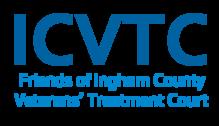
C L A S S I C A U G . 1 , 2 0 2 4 19TH



